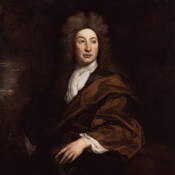
By Godfrey Kneller - Public Domain
John Dryden
Playwright
Biography
John Dryden
John Dryden, born August 9, 1613, is considered to be one of the greatest English poets of the 17th century. He is also a very prominent playwright and literary critic, who was at the forefront of the literary scene, with some referring to the 17th century as the Age of Dryden.
Dryden was born in the countryside of England to a country gentleman. In 1644, Dryden attended the Westminster School and was given a classical education, studying literature and translations. In 1650, Dryden began his studies at Trinity College, Cambridge, and graduated with a B.A. degree in 1654. By 1659, Dryden was already considered to be a notable poet.
Dryden’s early poetry was considered mature, sonorous, and filled with classical and scientific allusions. In 1660 when Charles II came back into power, Dryden wrote many poems to honor the King’s ascent to the throne. Since Dryden was in good favor with the monarchy, his poetry became a favorite with the court. On December 1, 1663, Dryden married Elizabeth Howard, daughter of the Earl of Berkshire. Together, they shared three sons. When the current poet laureate died in 1668, Dryden was appointed poet laureate and royal historiographer.
When King Charles II reopened the theatres, which had previously been closed by the Puritans in 1642, Dryden was one of a band of writers to create works for the revived English theatre scene. Some of Dryden’s greatest theatre works include Marriage a la Mode (1673), All for Love (1678), and The Indian Queen (1665). Dryden wrote almost 30 comedies, tragedies, and dramatic operas. His commentaries on poetry and drama and his translations were highly valued and earned him the title of “the father of English criticism”. After his death on May 1, 1700, Dryden continued to have a high reputation in the literacy community. In the 20th century, Dryden’s works experienced a notable revival, with many of his poems and plays being frequently studied and produced.
Shows
Shows associated with John Dryden
Monologues
Monologues from shows associated with John Dryden
Scenes
Scenes from shows associated with John Dryden
Quizzes
Quizzes associated with John Dryden
Learning Modules
Learning modules associated with John Dryden
Additional Information
N/A